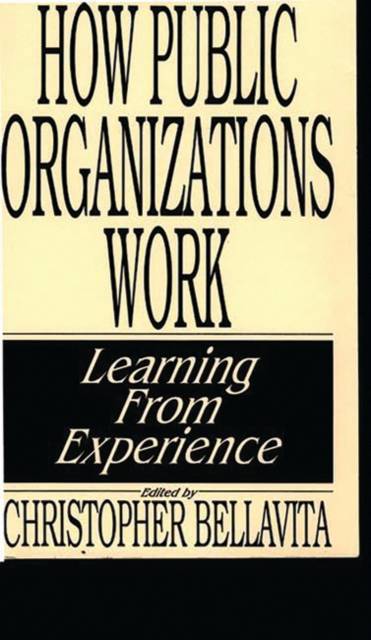
Door een staking bij bpost kan je online bestelling op dit moment iets langer onderweg zijn dan voorzien. Dringend iets nodig? Onze winkels ontvangen jou met open armen!
- Afhalen na 1 uur in een winkel met voorraad
- Gratis thuislevering in België vanaf € 30
- Ruim aanbod met 7 miljoen producten
Door een staking bij bpost kan je online bestelling op dit moment iets langer onderweg zijn dan voorzien. Dringend iets nodig? Onze winkels ontvangen jou met open armen!
- Afhalen na 1 uur in een winkel met voorraad
- Gratis thuislevering in België vanaf € 30
- Ruim aanbod met 7 miljoen producten
Zoeken
€ 161,45
+ 322 punten
Uitvoering
Omschrijving
Designed as a text for upper-level undergraduate-and graduate-level courses in public administration, public management, public policy, organizational behavior, this book looks at how people work effectively in public organizations. Written entirely by experienced practitioners, the text is unique in that it addresses throughout both the practical concerns of the working administrator and those of the theorist. By using their own on-the-job experiences as illustrative samples, the contributors clearly demonstrate how theory can improve practice and how practice can be used to generate theories.
Following an introductory chapter by the editor on the role of practitioners in the intellectual development of public administration, the text is divided into four sections. Part One, on the individual in public organizations, covers the ways in which managers learn and teach, presents an alternative contemplative paradigm of organizational behavior, and explores the role of the heroic individual in public administration. Part Two focuses on other people and public organizations, examining such issues as organizational learning, internal evaluation in organizations, organizational pathologies, and controlling conflict. Turning to the question of structure and public organizations, the contributors address ways in which organizational structure can be influenced, describe a learning model of organization, identify archetypes in organizations, and analyze the structure of power in public organizations. The final section looks at the management and leadership skills necessary to be successful in public administration.Specificaties
Betrokkenen
- Auteur(s):
- Uitgeverij:
Inhoud
- Aantal bladzijden:
- 256
- Taal:
- Engels
- Reeks:
Eigenschappen
- Productcode (EAN):
- 9780275933876
- Verschijningsdatum:
- 5/10/1990
- Uitvoering:
- Hardcover
- Formaat:
- Genaaid
- Afmetingen:
- 156 mm x 234 mm
- Gewicht:
- 535 g

Alleen bij Standaard Boekhandel
+ 322 punten op je klantenkaart van Standaard Boekhandel
Beoordelingen
We publiceren alleen reviews die voldoen aan de voorwaarden voor reviews. Bekijk onze voorwaarden voor reviews.











